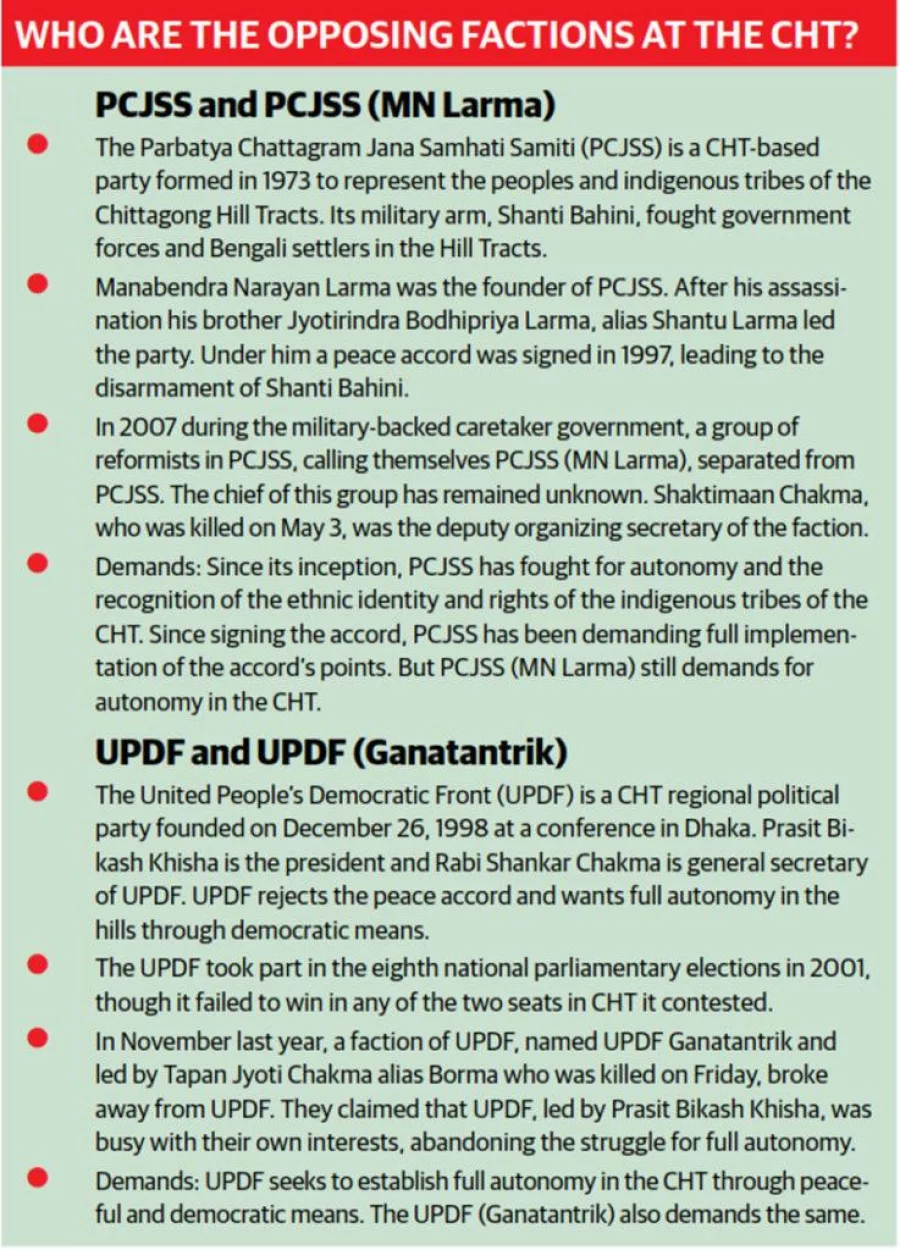The bodies are piling up in the Chittagong Hill Tracts as four local political parties based in the region’s ethnic communities appear to be engaged in violent conflict with one another.
For the peoples of the three hill districts, desired peace seems a far-off dream despite the signing of the CHT Peace Accord almost 20 years ago.
The four organizations are Parbatya Chattagram Jana Samhati Samiti (PCJSS), Jana Samhati Samiti (Reformist-MN Larma), United People’s Democratic Front (UPDF) and UPDF (Ganatantrik).
Security agencies and rights groups say over 500 people were killed in the last 20 years in bloody conflict, along with numerous abductions and assaults.
In just the last six months, 20 murders have been reported. Six people including a public representative and the chief of UPDF (Ganatantrik) were killed since Thursday.
Kapaeeng Foundation, a human right organisation for indigenous peoples of Bangladesh, said 18 persons of ethnic minority communities were killed in the CHT in 2017, while the number was 23 in 2016.
Law enforcement agencies have been unable to nab the key players behind such criminal activities. After each incident, the political parties blame each other.
Rangamati Superintendent of Police Alamgir Kabir said: “The armed regional ethnic organizations are locking horns over establishing dominance at the areas, leaving many casualties and killing.”
“We are collecting information about the people who are behind such anarchy and conducting drives to arrest them as soon as possible.”

Extortion at the heart of issues?
The problems are severe in the Rangamati and Khagrachhari districts, locals and law enforcement sources said.
Several security officials seeking anonymity said that the local groups were locked in a conflict over the massive amounts of extortion done in the region, which was the main reason behind all the attacks, kidnappings and killings.
Local businessmen of Rangamati and Khagrachhari said the four groups were extorting wood trade, kitchen markets, cattle markets, transport and many others, each in their own turf, all the while fighting each other to gain more ground.
The frequent abductions of ethnic people and Bangalis are also a big source of income.
Locals said they were afraid of informing authorities for fear of retaliation.
Security expert Maj (retd) Emdadul Islam said: “The existing groups of the CHT are fighting each other only for narrow self-interest rather than ideological issues or the rights of ethnic groups.”
Emadul said the poor vigilance of law enforcement on the hills were also to blame.
International CHT Commission Co-Chairman Sultana Kamal said: “If all the points of the CHT Peace Accord had been implemented in time, we would not be experiencing this bloody situation.”
“The CHT is being ripped apart by conflicts of self-interest. Such unrest is dangerous for the ethnic communities and other locals. Quick implementation of the CHT accord with the participation of local leaders is needed to stop such violence,” she said.
Politics of murder
The peace accord was signed in 1997 between the government and the Shanti Bahini led by PCJSS chief Jyotirindra Bodhipriya Larma, also known as Shantu Larma, to end the decades long insurgency and violence in Chittagong Hill Tracts.
While the UPDF, a breakaway group, still denounces the treaty and seeks full autonomy in the region, it proclaims to do so democratically.
But still the CHT is burning and hundreds have been killed in the hands of their own people.
There are now more splits among the political groups, the latest being UPDF Ganatantrik which broke away under Tapan Jyoti Chakma alias Barma in November last year. Barma was shot dead in an ambush on Friday, a day after his ally Naniarchar upazila Chairman Shaktimaan Chakma of the JSS (MN Larma) was assassinated.
Locals say the politics for the rights of ethnic minorities has devolved into racketeering and extortion from NGOs, aid agencies and local people, as well as arms smuggling.
Locals said they were forced to maintain good relations with all parties to stay safe. There are even reported incidents of abduction and rape of indigenous women from rival groups.
Three former members of Shanti Bahini told the Dhaka Tribune seeking anonymity that they were all forced to give monthly tributes to stay in their homes.
“If I refuse, they will kill me and my family members after labeling me anti-party,” said a former member of Shanti Bahini.
According to them, there is no ideological dispute among the active political groups. The only conflict is for supremacy and extortion from different quarters.
An Awami League leader in Rangamati said they were being held hostage before the armed groups.
He said: “People from the minority communities are more vulnerable than Bangalis and they are afraid to move at night.”
Several Awami League leaders from ethnic communities said that they were frequently threatened to quit politics. Some were abducted several times and released in exchange for massive amounts of money.





